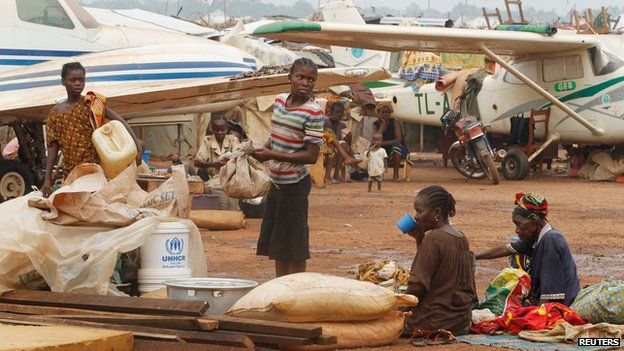Central African Republic: 'Ethnic cleansing' of Muslims
- Published

International peacekeepers have failed to prevent the ethnic cleansing of Muslims in the Central African Republic, a human rights group says.
Militia attacks have led to a "Muslim exodus of historic proportions", according to a report by Amnesty International.
Aid groups have warned of a food crisis, as many of the shops and wholesalers were run by Muslims.
The UN's World Food Programme has started a month-long aid airlift.
The roads are too dangerous to transport food without a military escort, WFP spokesman Alexis Masciarelli told the BBC.
This is why the UN agency is taking the more expensive option of flying food in from neighbouring Cameroon.
The first flight carrying 82 tonnes of rice arrived on Wednesday, with a further 1,800 tonnes of cereal to follow in the coming weeks.
This is enough to feed 150,000 people but he said it was not enough as 1.25 million need food aid in the country.
According to the UN, 90% of the population are eating just one meal a day.
Prices are said to have shot up after many Muslim traders fled the capital Bangui.
Mr Masciarelli said some of the food would be distributed immediately at a camp at Bangui airport, to which some 100,000 people have fled.
He said that food would also be distributed to schools, churches and mosques around the country where people have sought refuge from the violence.
'Acquiesced to violence'
France has sent 1,600 troops to CAR, along with 5,500 from African countries, to help combat a crisis which has lasted more than a year.
French Defence Minister Jean-Yves Le Drian is in Bangui to see the situation for himself.
On Tuesday, UN chief Ban Ki-moon warned that the country risked being divided into Muslim and Christian areas.
"Both Muslims and Christians have been murdered and forced to flee their homes," he said.
"The sectarian brutality is changing the country's demography. The de facto partition of the CAR is a distinct risk."
Muslims are being attacked after the mainly Muslim Seleka rebel force seized power last year and was accused of killing and raping Christian civilians and destroying entire villages.
Its leader stepped down in January but instead of defusing the situation, Christian vigilante groups - calling themselves the "anti-balaka" self-defence forces - have been taking revenge on Muslims, forcing them to flee Bangui and other towns.
Amnesty International claimed some of the international peacekeepers "have acquiesced to violence in some cases by allowing abusive anti-balaka militias to fill the power vacuum created by the Seleka's departure".
The BBC's Thomas Fessy says Muslims in CAR are being forced into exile
The London-based organisation called on the peacekeepers to break the control of the anti-balaka and station troops in areas where Muslims are being threatened.
The head of the French military mission in CAR, Gen Francisco Soriano, on Monday said the anti-balaka militias were "enemies of peace".
Amnesty also notes that Seleka fighters are continuing to attack Christians even after they have left the capital.
"The urgency of the situation demands an immediate response," said Joanne Mariner, senior crisis response adviser at Amnesty.
"It is time for the peacekeeping operation in CAR to protect the civilian population, deploy to threatened areas, and stop this forced exodus."